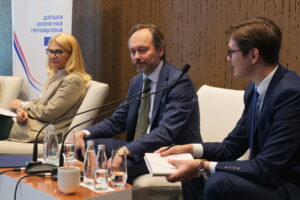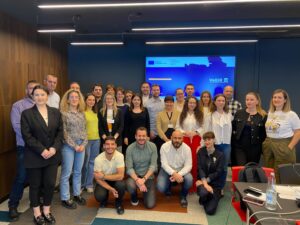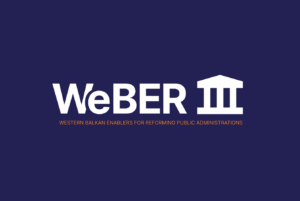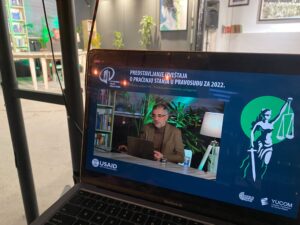Headquarters: Svetog Nauma 7, 11000
Office address: Đorđa Vajferta 13, 11000
Phone:: +381 11 4529 323
We are looking for a responsible and result-focused professional experienced in conducting the process of citizens consultation and delivery of training for CSOs.
From January 2022, the Foundation for Advancement of Economics – FREN and the European Policy Centre – CEP are implementing a project “Circular Migration before Depopulation! Innovative solutions to spark circular migration as a pillar of enhanced competitiveness and economic development”. The project is implemented with the support of the EU Delegation in Serbia through the “Civil Society Facility” Programme.
| Foundation for the Advancement of Economics (FREN) was founded in 2005 by Belgrade University’s Faculty of Economics with the overall goal of promoting national and regional policy-relevant research based on accurate data and sound methodology. FREN conducts independent evidence-based policy analysis in order to inform the public and policymakers about the available policy options and their ramifications. Thanks to the quality and relevance of its research, FREN has established itself as one of the leading think – tanks in Serbia and the Western Balkans region |
| European Policy Centre (CEP) is a non-governmental, non-profit, independent think tank founded in 2011 by a group of professionals in the areas of EU law, EU affairs, economics, and public administration reform. CEP’s team works with a shared vision of improving the policymaking environment in Serbia by rendering it more evidence-based, open, and inclusive, and more substantially EU-accession-driven. As of 2018, CEP is the best-ranked think tank in the Western Balkans and among the top ten in Central and Eastern Europe, according to Global Go To Think Tank reports. |
Serbia faces a severe emigration problem and needs to address it strategically. Global Competitiveness Index in 2018–19 ranked Serbia at 134th place out of the 137 countries included in the assessment regarding its ability to retain its talent or prevent ‘brain drain’. Many sectors in Serbia are affected by the increased emigration trend of qualified workers such as nurses, doctors, drivers etc. Challenges to regional development have become rather severe due to uneven population decline in different regions. Depopulated regions are usually, at the same time, low-income rural or post-industrial areas. Through the transformation of the local/regional CSOs into Regional Centres of Excellence for Circular migration (ReCeEx), this project enables CSOs to participate in a constructive policy reform dialogue and development of evidence-based policy options and recommendations on circular migration through which it directly assists the government in fulfilling the related economic migration policy goals and objectives. It will do so through an extensive process of building capacities of CSOs to understand the policy environment and advocate for improvements in circular migration policies.
EU Expert/Trainer for Citizens Consultations
The main aim of the training is to equip CSOs and future ReCeEx with sufficient knowledge and skills to conduct a series of online and face-to-face citizens’ and CSOs consultations with potential and current circular migrants on the local level. During consultation events, participants are supposed to share their perspectives, experiences, requirements, and concerns about becoming a circular migrant or already being one. After the consultation process, each of the four ReCeEx will be responsible for creating a consultation report that will sum up, categorise, analyse collected data, and make appropriate suggestions for policy amendments on the local level. The prior training, designed and held by the EU Expert/Trainer, will elaborate in detail on what type of information ReCeEx are supposed to extract from consultation participants, what consultation process formats are the most suitable ones, and provide a step-by-step guideline on how to conduct the consultation process.
The EU Expert/Trainer for Citizens Consultations shall be responsible for the following tasks:
- Design training programme for the representatives of the local Serbian civil society organisations; formulate training outlines, and determine instructional methods
- Develop training curricula and/or recommend or utilise programmes that meet instructional goals and objectives
- Create mandatory Guidance on Conducting Citizens’ Consultation
- Select or develop training aids, including training handbooks, demonstration models, multimedia visual aids, computer tutorials, and reference works.
- Evaluate the effectiveness of training and utilise relevant evaluation data to revise or recommend changes in instructional objectives and methods.
- Liaise with the relevant project experts and regularly report to the Project Manager
- Deliver two-day training to the representatives of the local Serbian civil society
The role requires the following competencies and skills from the successful candidate:
- University degree in Education, Training, Political Science or a related field
- A minimum of 5 years of experience in designing multiple training events in a civil society setting
- Proven track record in the design and delivery of European Citizen Consultations (ECCs)
- Excellent command of English
- Proven ability to master the full training cycle
- Familiarity with traditional and modern training methods, tools and techniques
- Strong interpersonal and communication skills
- Teaching and facilitation skills
- Ability to determine training objectives
- Ability to design, develop, implement, and evaluate training plans, curricula, and methodology.
- Skill in preparing instructional aids and plans
Contract
The EU Expert/Trainer for Citizens Consultations will be offered a contract for a period of five working days – two days for preparation, two days for delivery, and one day for reporting. The training will be held in Belgrade, Serbia and the Expert is expected to deliver training in person. The project implementation organisations will cover all travel expenses, including flight, accommodation, and meals.
The commencement date shall preferably be March 2023.
Applications and deadline
For applications to be valid, candidates must submit their application, consisting of a CV, work plan, and financial offer. Supporting documents (e.g. certified copies of degrees/diplomas, references, proof of experience, etc.) should not be sent at this point. Still, it may be requested at a later stage of the procedure.
Applications must be sent by 22 January 2023, 00:00 CET (submission date of recruitment form) at the latest to the following email address: office@cep.org.rs. Applications received after the deadline will not be accepted.
Data Protection
Please note that your personal data will be stored and processed by project implementation organisations in line with and for the period required by the purpose of the recruitment procedure.




